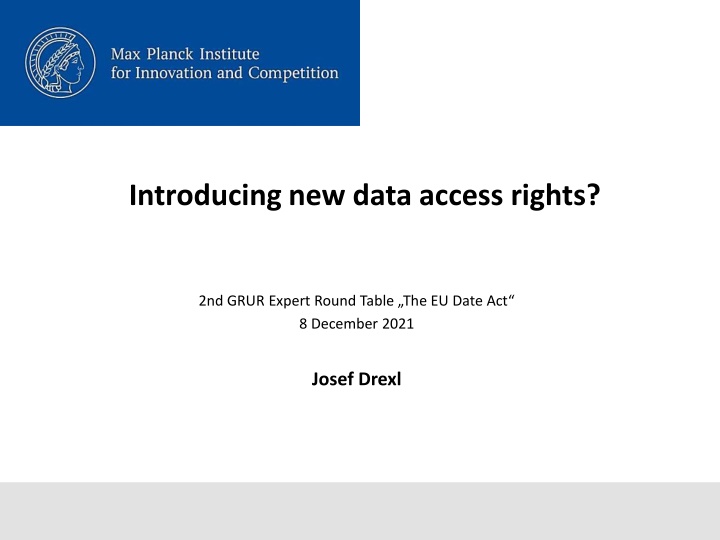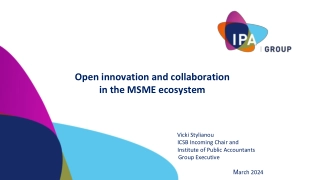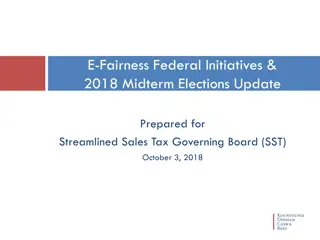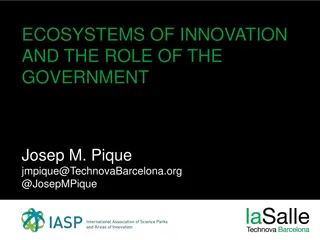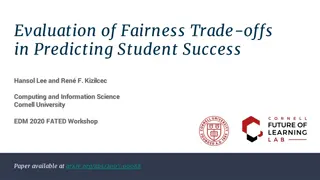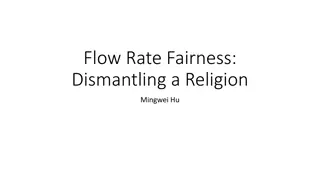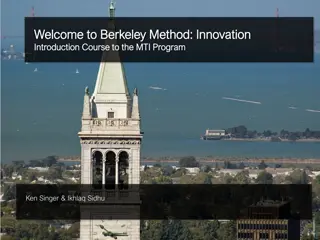EU Data Access Rights: Maximizing Innovation and Fairness in Data Economy
The 2nd GRUR Expert Round Table discussed the importance of introducing new data access rights in the EU, aiming to create a Single Market for data while ensuring fairness and clarity in data usage. The Inception Impact Assessment highlighted the need for increased data access to benefit various actors in the value chain. Strategies include promoting markets for secondary data uses and ensuring distributive justice. Challenges such as technical, business, and legal obstacles hinder data sharing, requiring solutions like FRAND terms for non-personal data access.
Uploaded on Sep 29, 2024 | 2 Views
Download Presentation

Please find below an Image/Link to download the presentation.
The content on the website is provided AS IS for your information and personal use only. It may not be sold, licensed, or shared on other websites without obtaining consent from the author.If you encounter any issues during the download, it is possible that the publisher has removed the file from their server.
You are allowed to download the files provided on this website for personal or commercial use, subject to the condition that they are used lawfully. All files are the property of their respective owners.
The content on the website is provided AS IS for your information and personal use only. It may not be sold, licensed, or shared on other websites without obtaining consent from the author.
E N D
Presentation Transcript
IIntroducing new data access rights? 2nd GRUR Expert Round Table The EU Date Act 8 December 2021 Josef Drexl
Data Strategy (February 2020) + Inception Impact Assessment (May 2021) (The Commission) will work towards the creation of a Single Market for data, where data is available for use in full respect of European values and rules, and where there are fair, practical and clear rules for access and use of the data. Announcement of a horizontal legislative initiative to create fairness in the data economy by addressing the difficulties of access to and use of data in specific situations, including in a B2B context Max Planck Institute for Innovation and Competition
Inception Impact Assessment (May 2021) Why? Innovation economics Economics of non-rival data: Increase of data access and use more actors will benefit from big data analysis and machine learning All parties in the value chain should be able to use of data to benefit from digital innovation Data access and use by innovative startups and SMEs Promoting markets for secondary uses Distributive justice Ensure fairness in the allocation of economic value among the actors of the data economy but ambivalent: safe sharing of data, no misappropriation (trade secrets) Max Planck Institute for Innovation and Competition
Inception Impact Assessment (May 2021) How? Besides contract law solutions (including B2B fairness test): data access and use rights potentially on the basis of FRAND terms for non-personal data Applicable to specific data, such as non-personal data generated by objects connected to the IoT in professional use, or to a wider set of data sharing situations Max Planck Institute for Innovation and Competition
What is the problem? Not enough data sharing! A1: enhance voluntary data sharing A2: Mandate data sharing where voluntary data sharing is not taking place Analysis: Q1: Who is the data holder (as a business)? - Depends on the business model often investor in digital innovation - De facto exclusivity ( de facto data owner ) Q2: Obstacles to data sharing? - Technical obstacles (lack of interoperability, standards) costs - (Illegitimate) business incentives - Legal ones (such as data protection, IP rights) Max Planck Institute for Innovation and Competition
Fundamental challenges (1) Justification for non-contractual data access rights? Data access as a duty to deal obligation Is fairness enough? Need for a market failure analysis? (2) Legal conceptualization of data access rights - Allocation of data access rights? - Data access at the crossroads of multiple fields of the law (including new data laws) (3) Concrete benefit of horizontal data access rights of the Data Act - in addition to contract law - in addition to sector specific data access rights - in the light of emerging digital contexts (platform economy, IoT, AI, cloud, etc.) Max Planck Institute for Innovation and Competition
Mapping data access rights Starting Point: Classical competition law (data as an essential facility) (Magill, Microsoft) Market Addressee right holder justification Primary market Dominant firm Secondary market Competitor (vertical integration) Competitor Exclusionary conduct, leveraging of dominance, harm to follow-on innovation Max Planck Institute for Innovation and Competition
Mapping data access rights New competition law (data as an essential facility) 19(4) No 4 GWB (2021): German essential facilities provision Market Market Addressee right holder justification Primary market Dominant firm Secondary market Vertical integration no longer required Undertaking dependent on data access exclusion of effective competition Art. 102 TFEU? Not clear whether applicable in the same sense - Would harm to dynamic competition in secondary market suffice? Max Planck Institute for Innovation and Competition
Mapping data access rights Competition law as a means to address superior bargaining power! Example: 20(1b) GWB Market Market Addressee right holder justification Primary market (including data market) Firm with relative market power based on data dependence exclusion of effective competition (horizontal exclusion) Art. 102 TFEU? Secondary market Not clear whether applicable in the same sense - Would harm to dynamic competition in secondary market suffice? data access Undertaking dependent on exclusion of effective competition (vertical exclusion) Max Planck Institute for Innovation and Competition
Mapping data access rights Stepping outside competition law: The Digital Markets Act Addresssees: Gatekeepers (providers of core platform services) Art. 7(g) Art. 7(h) Art. 7(i) Art. 7(j) beneficiaries Advertisers, publishers Buisiness and end users Business users and authorized third parties Competing search engine operators required Access to performance measuring tools + information Portability of data generated by use (including real-time access) Access and use of aggregated and non-aggregated co- generated data (incl. real-time) click and view data of end users using the gatekeeper s search engine Protected market Market of advertising customers Market of business + consumer protection Market of business users and secondary service markets Primary search engine market ( contestability Max Planck Institute for Innovation and Competition 10
Mapping data access rights Situation for different sub-fields of digital application Field Existing law/proposals Data Act? Plattform economy DMA + Connected (IoT) devices 20(1b) GWB (only B2B), sector specific regulation Most important (including B2C data sharing) AI Development + digital start-ups 20(1b) GWB So far: more than unclear! Cloud services Art. 7(h) and (i) DMA: cloud services as core platform services (Amazon, Microsoft) General data portability right beyond gatekeepers? Max Planck Institute for Innovation and Competition 11
Mapping data access rights What is missing? Several cases (1) Data access of owners and users of IoT devices ( fairness of product design ) (2) Third-party service providers related to IoT devices (based on authorization of the owner and user of the device) (3) Data access rights of component part producers (contract law solutions may suffice) (4) Access for the purpose of follow-on innovation (AI, startups, etc.) Horizontal regulation more difficult (developing the idea of 20(1a) GWB) More caution regarding access of competitors (5) General portability right regarding cloud services Max Planck Institute for Innovation and Competition 12
General evaluation (1) Additional data access rights needed! Especially in the field of IoT devices (2) Horizontal data access rights are only second-best Sector-specific rules and targeted governance systems to be preferred. Horizontal data access rights as a fall back-rule. Need to look beyond IoT devices and cloud services (focus of the Data Act) (3) Against restriction to non-personal data (contrary to Inception Assessment). Respect of GDPR should be safeguarded within the rules (see Art. 6(h) and (i) DMA) (4) B2B access rights for innovation - Data dependence as a possible legal connecting factor - Size or age of the firm (SME or startup) should not be relevant in the law - Differentiation as regards claims of competitors and non-competitors. As regards competitors, the new product rule could be a requirement - Exclusion of MGD from sui generis database protection may not suffice for AI development in particular (5) Private enforcement necessary! DMA is overlooking the issue! (6) Remaining legal problem: Conditions of access? FRAND enormously complex and requires context-specific application Max Planck Institute for Innovation and Competition 13
